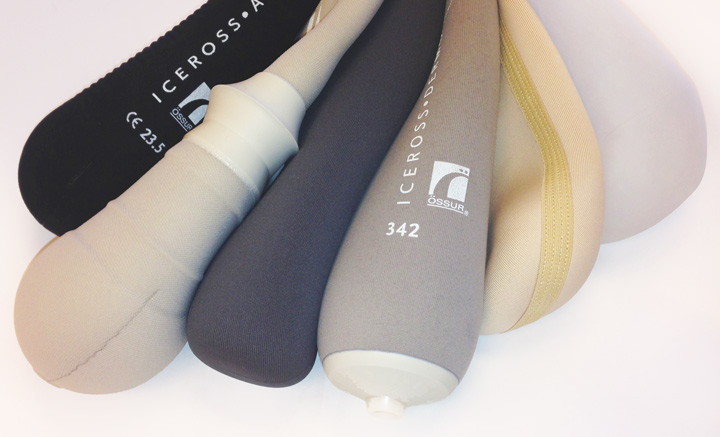MCOP Blog
Insights from our prosthetists about new technology, advances in prosthetics, & more
Prosthetic Liners: A Conversation with Our Prosthetists
July 7, 2014Often under appreciated, liners are the foundation of a comfortable and effective prosthetic. What are the differences between liners, what advancements have been made in liner technology, and what type of liner is right for you?
We discussed a few of common questions with our prosthetic team and have the following to report:
Why are liners important?
Liners are important because they are the best available means of preventing skin abrasions, reducing bone pressure in the prosthesis, and improving socket suspension for amputees.
How are prosthetic liners made?
Over the years, liner materials have evolved greatly, and popular materials today include thermoplastic elastomer (TPE), polyurethane, and silicone. Each material has its own strengths and weaknesses.
Liners also come with a variety of suspension options. Suspension is how the prosthetic is held on to an amputee’s residual limb. Common suspension systems include pin, vacuum, suction, contact/sleeve, and seal-in liner systems. Like the liner materials, these suspension systems have their own unique strengths and shortcomings.
Are there any trade-offs when using a liner?
In fact, there are. While liners have numerous benefits for amputees, they also can cause perspiration issues, hygiene concerns and occasional skin breakdown. However, all things considered the benefits of liners far outweigh the costs.
What prosthetic liner is right for me?
Clinically, we begin by reviewing the current liner that an amputee is using and diagnose the level of comfort and mobility that it provides. We then assess the residual limb and decide what liner and suspension technologies are most appropriate for each individual’s specific needs based on our clinical judgment and experience. Too often, we meet amputees who have been given a one-size fits all liner solution by their previous prosthetic clinic. Liner material, design and suspension type all influence the comfort, fit, skin compatibility and durability of the prosthesis. Where many companies have a very strong preference for one type of liner, the prosthetists at MCOP select liners based on your specific lifestyle and a variety of other clinical factors.
What are the best liner companies?
At MCOP, we use a variety of liner companies based on the individual amputee and their lifestyle and medical condition. Quality liner manufacturers that we commonly select for our customers include Ossur, OttoBock, Alps, and WillowWood. While there are others, the quality from other manufacturers tends to lag significantly behind these companies and we rarely choose them for our customers as a result.
Is it normal for liners to break down quickly?
Yes and no. While liners do commonly break down, there is a dirty little secret about liner breakdown that often isn’t mentioned by prosthetists. Liner breakdown is often the result of an improperly fitting socket, and is not necessarily due to a lack of quality in the liner itself. If your liner is breaking down regularly in the same location, you may want to consult your prosthetist!
Have more questions about prosthetic liners? Ask us!
